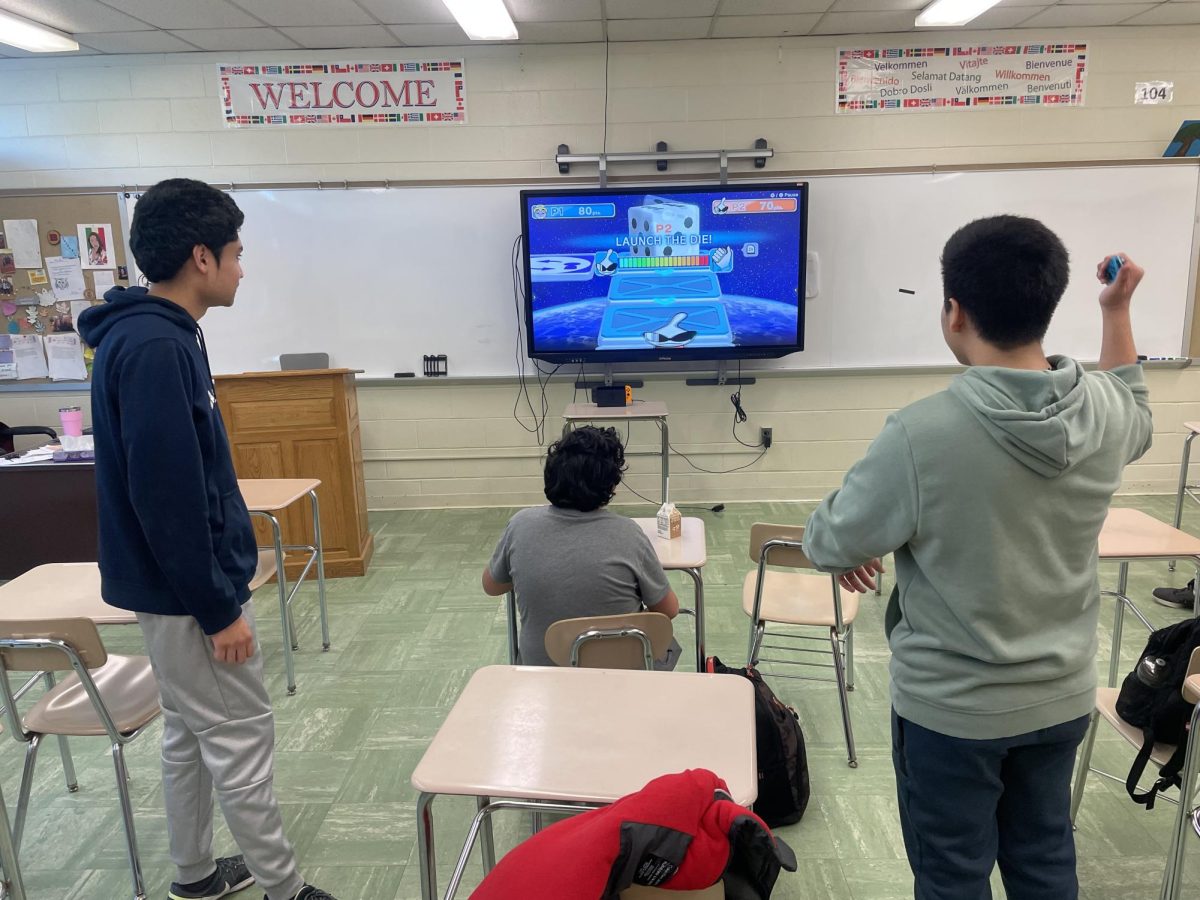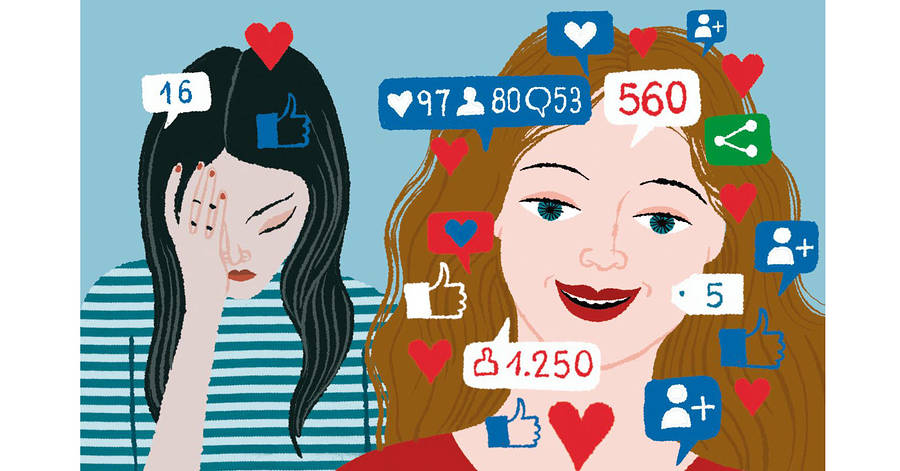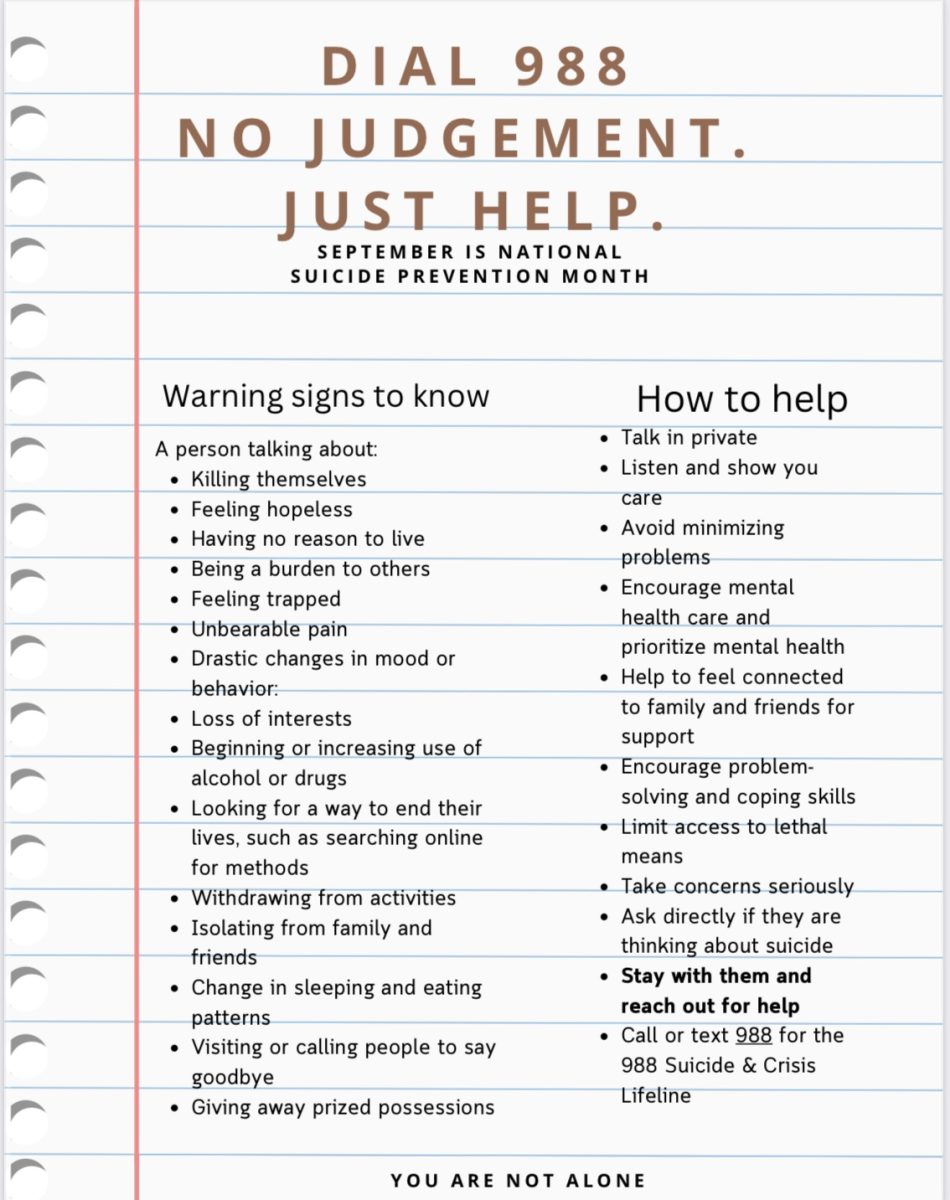Video games are a fun and entertaining way for people to pass the time. Like most things, though, they should not be used in excess.
“Video games can provide a lot of entertainment value,” says video game club advisor Dr. Bryan DeSousa. “It’s up to each player to decide how much time they play and still get their responsibilities done.”
Research on video games shows that they do have positive effects on the human mind, helping people develop certain skills. This includes:
- Improved literacy levels
- Problem-solving
- Teamwork
- Coordination
- Multitasking
- Acclimation to technology
- Memory & Perception
Studies show, “the more adolescents reported playing strategic video games, such as role-playing games, the more they improved in problem-solving and had increased grades the following year.”

When anxious or upset, a person’s mood can easily be improved by engaging in something as simple as turning on your phone and playing a quick round of Angry Birds. Video games are also shown to teach children how to “learn resilience in the face of failure” and “build emotional resilience they can rely upon in their everyday lives.”
Despite the “socially isolated gamer” stereotype, more than 70 percent of gamers play with a friend and millions of others worldwide online. “Multiplayer games become virtual social communities, where decisions need to be made quickly about whom to trust or reject and how to lead a group,” says the American Psychological Association. Even more brutal video games like FPS (first person shooters– i.e. Call of Duty, Valorant, Half Life, etc.) encourage cooperation.
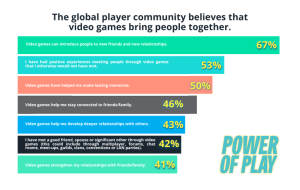
Additionally, video games are also used to comfort and improve the health of children and adult patients in the hospital. The game “Re-Mission” was designed for teen cancer patients by the HopeLab Foundation. In the game, patients can “control a tiny robot that shoots cancer cells, [overcome] bacterial infections and [manage] nausea and other barriers to adhering to treatments.” Research proved that patients who played the game showed significant improvement during their chemotherapy treatment. Authors at the American Psychological Association recommend that teams of psychologists, clinicians and game designers work together to develop approaches to mental health care that integrate video game playing with traditional therapy.
While video games have their positives, there are also downsides.
Video game addiction, also known as internet gaming disorder, is “a condition characterized by severely reduced control over gaming habits, resulting in negative consequences in many aspects of your life, including self-care, relationships, school and work” according to Cleveland Clinic’s article “Video Game Addiction.”
Video game addiction is most commonly linked with mental health problems like depression, anxiety disorders, obsessive-compulsive disorder (OCD), attention deficit hyperactivity disorder (ADHD) and impulse control disorders.
Many researchers link video-game addiction to gambling disorders, in the same way that the “rush of winning becomes one of the main reasons for playing.”
Senior Lucas Lin states, “Video games are addicting, yes, because of the dopamine that hits you when you perform certain actions. They get you to keep playing them because they keep you in a fulfillment loop.”
Dopamine is a brain chemical that releases while playing video games, and is responsible for feelings of pleasure, satisfaction, and motivation.
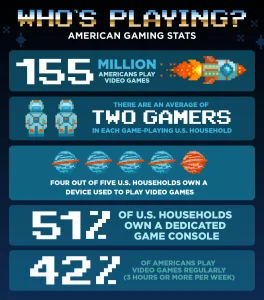
Lin continues, “For example, if you make contact in a targeting game, you get an XP popup and bright colors flash; as opposed to other disciplines like reading, exercising, etc. Short term dopamine rushes are much more appealing than long term gain.”
When people think “video-game addiction,” most people think of online player games, such as MMORPGs (massively multiplayer online role-playing games), which are known to be especially addicting “due to their sprawling worlds and endless quests and content to consume.” Online games include more popular games such as Fortnite, Call of Duty, Minecraft, World of Warcraft, Roblox, and League of Legends.
However, video game addiction can also heighten in the palm of one’s hand, with the use of mobile games. Games like Genshin Impact, Candy Crush Saga, RuneScape, PUBG, and Pokémon GO are equally as addictive. This could also apply to those in older generations, for those with grandparents who are on level 700-something of Candy Crush.
Solo games, while not known to be as addictive, include the Legend of Zelda series, the Mario Brothers series, the Assassin’s Creed series, Dark Souls, and many more.
During the 2020 pandemic, people would use video games as a means of calming their increased anxiety surrounding public health. As people began to take their real-life friendships online while in lockdown, many online games found their numbers of gamers increasing.
“Many studies found that the prevalence of gaming disorder increased, which was estimated to be between 2.3 and 29.4%, and the global prevalence of Internet Gaming Disorder (IGD) was 1.96% before the pandemic,” according to addictionhelp.com’s article.
Former Atari employee and current Becton Wildcat Mr. Bill Carr believes video games are a “complete waste of time.”
“Folks would send in their broken games and cartridges and we would take care of the issue. Next door was the arcade console department,” Mr. Carr explains. “We were required to play repaired games for a total of five hours a week, to make sure they were working properly. That ended any affinity with video games.”
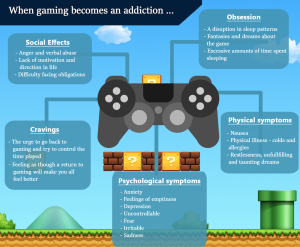
Symptoms of video gaming disorder include:
- Poor performance at school, work or household responsibilities as a result of excessive video game playing.
- Withdrawal symptoms, such as sadness, anxiety or irritability, when games are taken away or gaming isn’t possible.
- A need to spend more and more time playing video games to get the same level of enjoyment.
- Giving up other previously enjoyed activities and/or social relationships due to gaming.
- Being unable to reduce playing time and having unsuccessful attempts to quit gaming despite the negative consequences it’s causing.
- Lying to family members or others about the amount of time spent playing video games.
- A decline in personal hygiene or grooming due to excessive video gaming.
- Using video games as a way to escape stressful situations at work or school or to avoid conflicts at home.
- Using video games to relieve negative moods, such as guilt or hopelessness.
Video gaming disorder can be diagnosed through an evaluation by a psychiatrist or psychologist. For video gaming disorder to be diagnosed, however, your gaming patterns must be extreme enough to result in significant impairment to your personal, family, social, educational and/or occupational functioning. These patterns usually have to exist for at least one year.
The most common form of treatment for video gaming disorder is psychotherapy, or talk therapy. “Psychotherapy is a term for a variety of treatment techniques that aim to help you identify and change troubling emotions, thoughts and behaviors,” Cleveland Clinic elaborates. Any underlying mental health conditions caused by video game disorder, such as depression, anxiety, or ADHD, may be treated using other specific types of medication prescribed by a healthcare professional.
If you are worried about gaming habits of either yourself, a friend, or loved one, reach out for help! While most people who play video games do not develop an addiction to them, it is always wise to limit screen time and involve yourself in activities away from your phone or consoles. It’s important to make plans and socialize with others, as advised by Dr. DeSousa.
Sources:
- https://my.clevelandclinic.org/health/diseases/23124-video-game-addiction
- https://www.addictionhelp.com/video-game-addiction/statistics/#:~:text=Video%20Game%20Addiction%20and%20the%20COVID%2D19%20Pandemic&text=Many%20studies%20found%20that%20the,was%201.96%25%20before%20the%20pandemic.
- https://www.apa.org/news/press/releases/2013/11/video-games


